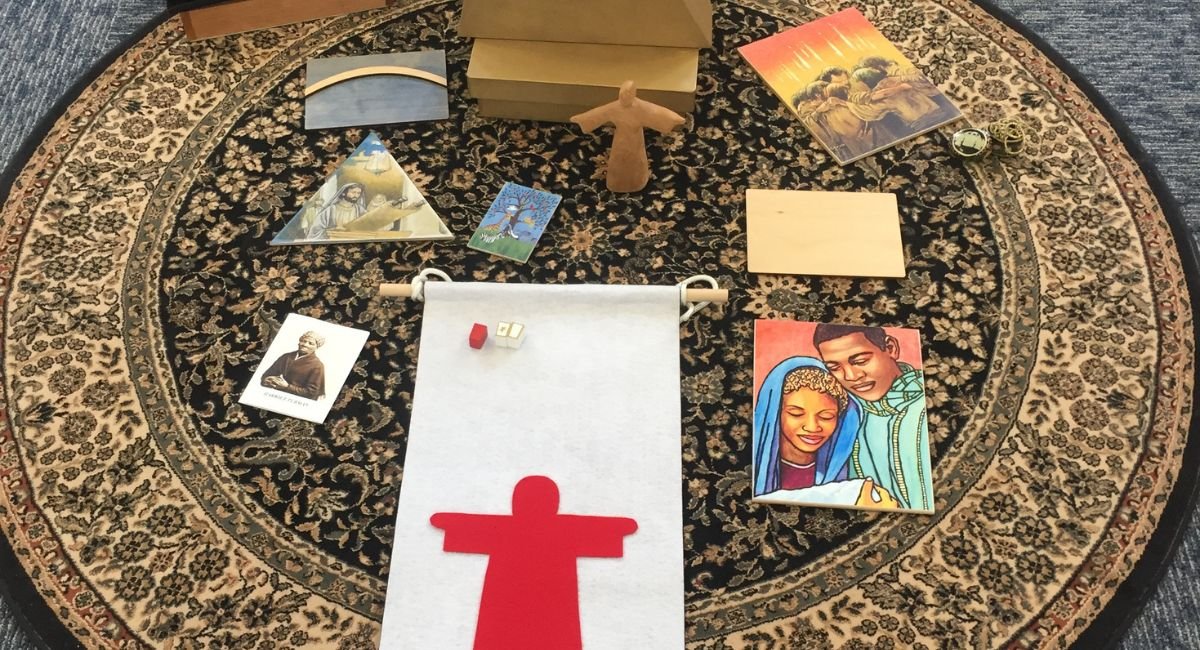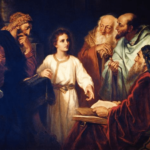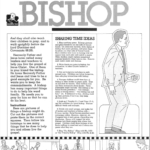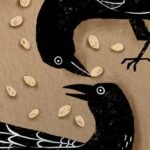[ad_1]
As an educator, I live for the summer. I would say, “Don’t tell my students!” but they already know! As much as I relish walking alongside them as they mature in their lives and faith, the summer offers the opportunity to pause and reflect.
The last few summers have offered all of us myriad occasions to reflect, especially on ways to center inclusion and justice in our worship community and to affirm the dignity and humanity of those made in God’s image whom our society relegates to the margins. The summer also invites me to wonder, Are we building (and expanding) an inclusive, beloved community? Reflection for me has included “pray[ing] without ceasing” (1 Thessalonians 5:17). It has also included trusted conversation partners in Godly Play.
I’ve written elsewhere about the Godly Play Foundation’s response to what I call the George Floyd Moment in the summer of 2020 (see “Would We Still Mourn Jesus as a Black God-Man?“). Those of us who remember that summer likely cannot forget it. In case anyone in our Godly Play Circle (class participants) forgets, Godly Play invites us to remember.
Reflecting
In How to Be an Antiracist, historian, scholar, and author Ibram X. Kendi defines racism as “a marriage of racist policies and racist ideas that produces and normalizes racial inequities.” By now we know that racism exists in the body of Christ. By extension, it is highly probable that it exists in our Godly Play Circle. Hence, it behooves us to undertake the big work of finding and uprooting it.
Some may wonder whether young children are aware of race or racism. However, the American Psychological Association finds that children are aware of racial difference as early as infancy (see “Children Notice Race Several Years Before Adults Want to Talk About It” from Aug. 27, 2020). It is not too early to begin having age-appropriate, formative discussions about the imago Dei extending across racial difference. Servant of God Sister Thea Bowman, one of six African-American Catholics currently being considered for sainthood, advocated for racial inclusion and racial justice within the Roman Catholic Church throughout her ministry. She once said, “If we can start with our little children, and lead them by the hand, and teach them to be comfortable with people who are different than they are, that is something” (see Thea’s Song: The Life of Thea Bowman by Charlene Smith, FSPA and John Feister).
This is big, important work that has societal and eschatological ramifications. Just as the work differs for every person in the Circle, every community’s work is different. As you look around your community, congregation, classroom, or Circle, . . .
Do you notice anyone missing?
Are there any policies that exclude others from participation, unintentionally or intentionally?
Do any voices need amplification?
I wonder what your work will be?
Responding
As I wrote in the linked piece above, the George Floyd Moment invited the Godly Play Foundation to discern how to respond faithfully in order to affirm and nurture the imago Dei in all people, especially Black and Brown people who are too often missing from our Circles. This discernment led to the formation of an Anti-Racism Task Force followed by the Beloved Me, Beloved Me Initiative and the creation of an Equity Audit Team. I had the opportunity of serving in some capacity every step of the way.
The Anti-Racism Task Force began its work in January 2021. It was made up of five people, and this committee embodied the ecclesial, ethnic, denominational, gender, geographic, and sexual orientation diversity that is reflected across the church. We met for roughly three months, and, using Dr. Kendi’s definition above, we searched for areas where racism existed within the Godly Play Circle and sought ways to remedy it.
Our task force helped to create the Beloved Me, Beloved We Initiative. The vision of this initiative is “to delightfully and prophetically inspire brave spaces so that every child who comes close to Godly Play encounters a felt sense of their inherent worth and dignity as one uniquely and fully created in God’s image (Beloved Me) and co-creates a way of being and inspiring inclusive communities which celebrate the diversity of God and God’s creation (Beloved We).” One of the recommendations that arose from the initiative was to commission an equity audit of all Godly Play curriculum and materials and aim to ensure that Godly Play’s language and ethos reflect the expansive Circle that Godly Play intends to draw.
As storytellers, parents, caregivers, educators, and faithful Christians, we aim to draw an inclusive, invitational, and theologically sound Godly Play Circle where all of God’s children are welcomed to wonder. As you reflect on your community, . . .
I wonder how you might respond to what has emerged?
I wonder if you can identify two or three S.M.A.R.T. (Specific, Measurable, Achievable, Relevant, and Time-based) responses to get your community started?
Remembering
The Godly Play Foundation’s response involved forming the Equity Audit Team to continue this work. The Equity Audit Team is re-membering—literally combing through the entire Godly Play curriculum looking for and correcting bias, whether implicit or explicit, in our stories. This entails auditing our storytelling and training curricula, materials, and processes to identify the terms, phrases, art, and materials that “bump” children and adults out of the Circle. We are updating our language and materials to draw the Circle wide. We aim to cultivate belonging and affirm each person’s worth in a Godly Play classroom. In addition, we aim to increase access to those updated lessons and materials. Lowering or eliminating bars of entry is another way to draw the Circle wide.
Working
I chose gerunds for “reflecting,” “responding,” “remembering,” and “working” to convey that this work is ongoing. This is also big work: The curriculum includes over 90 stories with almost 900 materials! We are examining the curriculum with a racial equity lens, guarding against and uprooting implicit bias, racism, and white supremacy. In addition, the audit includes examining the myriad ways that xenophobia manifests in our culture. This includes but is not limited to ableism (including learning differences), classism, sexism, and heteronormativity.
The Equity Audit Team’s task is not to rewrite existing stories. However, we are creating toolkits with revisions that address implicit bias and placing them on the website as the revisions are available. Anyone who is interested can find them here.
We are actively enacting the work that God has given to us.
I wonder what work God has given you to do in your community.
I wonder whether you will join us in ours.
I wonder how we may reflect, remember, respond, and work anew.
I wonder how wide we can draw the Circle if we work together.
References
“Children Notice Race Several Years Before Adults Want to Talk About It.” American Psychological Association. August 27, 2020. https://www.apa.org/news/press/releases/2020/08/children-notice-race
Grisom, Ebony. “Would We Still Mourn Jesus as a Black God-man?: A Reflection on the Faces of Easter.” Godly Play Foundation website. January 23, 2023. https://www.godlyplayfoundation.org/news-and-blog/would-we-still-mourn-jesus-as-a-black-god-man-nbsp
Kendi, Ibram X. How to Be an Antiracist. New York: One World, 2019.
Smith, Charlene, FSPA, and John Feister. Thea’s Song: The Life of Thea Bowman. Maryknoll: Orbis, 2009.
Featured image is provided by the author, Ebony Grisom
[ad_2]
Source link







You must be logged in to post a comment.